
(originally published 2019/12/30 on wordpress)
from the darkness, a being emerges, her entrance heralded by three flourishes of the lyre. she begins to share her musings with you, which are abstract and theological in nature. the lyre is plucked in a drifting, austere melody, the notes falling like drops.
her speech ends, and another being comes forth. suddenly, a new song begins. this one is lush, polyphonic, sweet--it wraps you up in its embrace. this figure with a beautiful voice doesn’t care about theology; she is concerned about you. her song is such a departure from the previous, not abstract but sensual. it is like a doorway into another world, a promise of warmth and beauty.
***
in one light, anodyne 2 is an allegory about family and abuse.
from the moment of her birth, nova is ushered into the belief system of her controlling religious guardians. her guardians raise her to become not just a disciple of their faith, but a kind of missionary-soldier for it, bringing herself and the world closer to the immaculate center. in becoming a nano cleaner, nova is deprived of her autonomy and her right to self-determination. she is barred from learning or thinking anything that deviates from her guardians’ worldview, and she is given no say in what she can do with her time or her body. everything, from her biological makeup to her beliefs, is controlled by her parents and the god they worship.
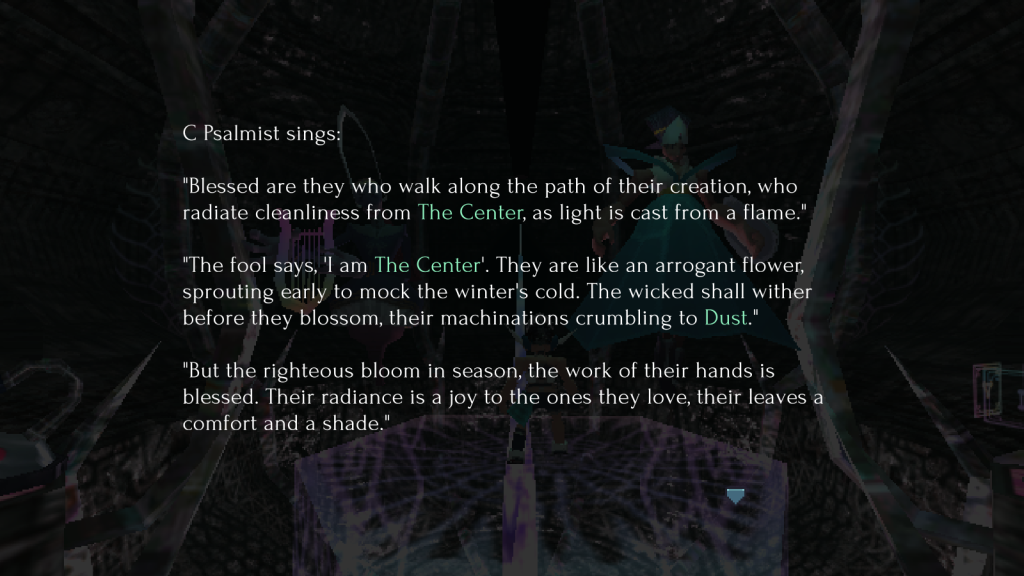
in another light, anodyne 2 is a story about labor, exploitation, and hegemony.
nova was created with the sole purpose of being a nano cleaner. to the center, she serves no function except as a source of exploitable labor. thus, psalmist shows no restraint in working nova to exhaustion. the goals of the center are infinitely more important than nova’s own happiness or well-being.
and what are the center’s goals? at first, it appears that the center wants nova to heal sick people. over time, though, it becomes clear that the center’s only aim is to bring more and more territories under its own holy order. ridding the world of nano dust will allow the center bring everything and everyone under its dominion. the dust that nova gathers is mere fuel for the engine of imperialism.
***
what rings true about nova’s predicament is that there is explicitly no distinction between the personal and political. these two levels on which ano2’s narrative operates--a "personal" story about familial trauma and a "political" allegory about labor and imperialism--are really the same. psalmist and palisade act as nova’s parents, but simultaneously function as her workplace supervisors, surveilling her progress and keeping her productive. subsequently, nova’s decision to confront the center arises not only from a desire to rebel against her controlling parents, but also a refusal to be complicit in the imperial violence of the center.
anodyne 2 is a game about the personal and emotional journey that nova undergoes in order to arrive at this final moment of refusal. in this essay, i want to look at how nova begins the process of healing from the trauma she experienced in childhood, and how this healing is inextricably tied to her unlearning the toxic, violent ideologies of her guardians. i want to examine how nova learns to love and trust herself and those around her, and how this love necessarily leads to the center’s destruction. in essence, this essay is an attempt to retrace the steps of nova’s emotional and political revolution, from religious authoritarianism to a kind of queer anarchy. it is also a love letter to the game’s “quietly radical” politics of care, vulnerability, and communality that make revolution not just possible, but inevitable.
1.
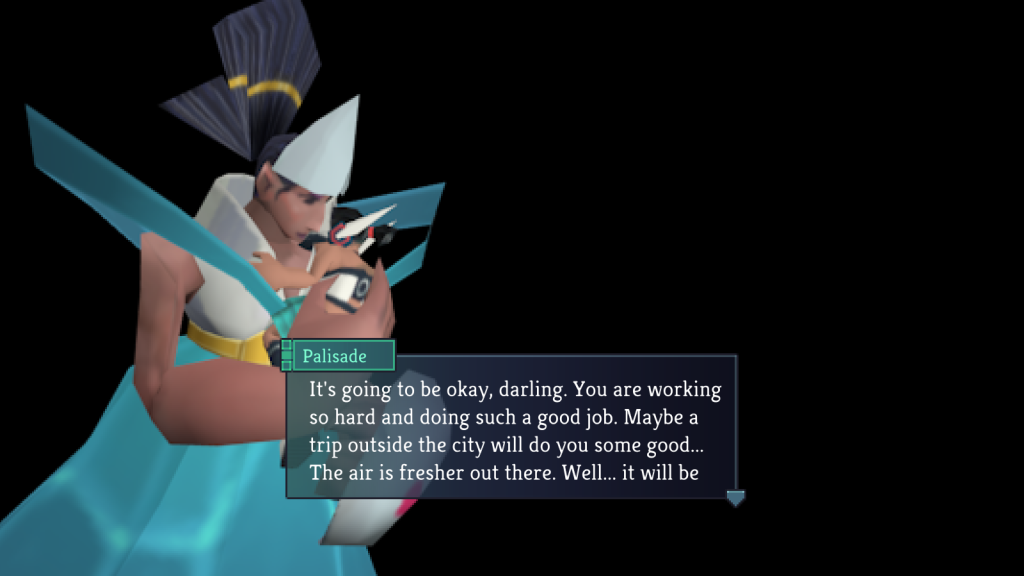
i think the best place to begin is with the body, because the body is the primary site of conflict between nova and the center. in the very first section of the game, the center implants its tools of control into nova's brain, disguised as blessings. psalmist tells nova that the glandilock seed is “sacred”--the implication being that nova’s flesh isn't. her body is a mere vessel, made to receive the center’s holy gift. her being is mere matter, which must be transfigured and regulated according to the center’s wishes.
yet, despite its conditioning, nova’s body is the first site of protest. the acts involved in nano cleaning leave her tired, nauseous, viscerally uncomfortable. after her third cleaning, the strain of her work causes her to faint. nova is embarrassed by this incident, and the next time she finishes a cleaning she tries to hide her exhaustion from palisade. she wants to be what her parents want her to be: a machine, always functioning and invulnerable. and yet, she cannot suppress the essential animality of her body.
***
nova’s exhaustion resonates clearly with the plight of the worker under capitalism. but i also think there’s a buried reading here about gender and queer repression. gender isn't something explicitly codified in anodyne 2’s world. however, i don't think it's a stretch to say that the center's rigid and binaristic moral system, as well its castigation of anything that violates the center's narrow definition of propriety, borrows from christianity's discourse on purity and sin, and its repression of "deviant" expressions of gender and sexuality. the center's confinement of nova into the role of nano cleaner seems to me no different from how systems of control (religious and otherwise) socialize and confine people in/to oppressive social roles in general.
in this reading, "nano cleaner" functions less a job than as a metaphor for, say, masculinity or heterosexuality. as such, nova's exhaustion is not merely muscular strain, but the physical, emotional, and psychical burden of trying to be who her parents want her to be, of denying parts of herself in order to fit an oppressive norm. nova's body hurts because it knows what it is and what it wants.
***
it's not surprising that the center's response to nova's pain is to just "repress harder"; but what is interesting is how they teach her to do so. specifically, psalmist teaches nova not just to ignore her body, but to actively hate it, which manifests most clearly in these lines from one of psalmist's verses:
wedges of flesh, rafters of bone, pendulous and swinging organs
you are made of bloody baggage, it weighs you down
in these lines psalmist describes the body as a burden, a disgusting, onerous thing that produces and experiences suffering. if nova feels pain and discomfort in her work, it is only because the body is an inherently shoddy, decaying construction. flesh and blood are mortal, and therefore doomed. the only joy that nova can hope to find is in the perfect and everlasting beauty of the center.
teaching nova to hate her own body is an insidious form of abuse. it is designed to further entrench her in religious devotion and render her a more obedient worker. by teaching nova that her body is a false source of morality, psalmist suggests that nova can't trust herself to guide her own behavior. she needs an external source of guidance like her guardians to lead her down the right path. furthermore, if nova believes her flesh is innately unclean, then that means its suffering is not only permissible, it is necessary and just. she deserves the strain of her work, the ache of her repression. and if nova can believes that pleasure is wrong and pain is right, then her parents can convince her that their abuse is actually love.
2.

ostensibly, the goal of nova's work is to heal the sick. really, the sick serve as cautionary tales for nova, horror stories about how unruly and unhappy people would be without a guiding force like the center.
the illness brought about by nano dust manifests in its hosts as a form of excess. these people are characterized by their lack of self-restraint, their indecent displays of grief and wretchedness. bran shows nova the danger of succumbing to one's passions; gwom, the danger of straying from the center's light; misteria, the unsightliness and decay of old age; and gustine, the danger of pursuing pleasure and feeding one's desires. for these people, nano cleaning is the necessary corrective act that contains their emotions and brings them closer to the center.
yet, nano cleaning is ultimately a shallow, individualistic form of care. like a drug, nova enters the bodies of the sick in order to alter their internal chemistries; but removing dust does not alter the material conditions of the sick, or solve their problems. it merely dulls their passions, pacifying them; after all, an anodyne is just a painkiller, not a medicine.
at the heart of nano cleaning lies the neoliberal sentiment that (mental) health is a bio-personal issue (see also: mark fisher's capitalist realism). in this framework, bad health and resultant suffering are completely de-linked from any external circumstances--the toxicity of the environment due to industrial and nuclear waste, the stress of having one's labor exploited for 40, 50, 60 hours a week. no, the cause of these people’s sickness must be the result of some arbitrary chemical imbalance, or worse, some fatal moral flaw. meanwhile, what is left untouched are the very institutions like the center that find ways to benefit from that illness, while maintaining the overarching systems of oppression and exploitation that keep the world a terrifying, toxic, and violent place to live in.
***
susan sontag (quoting the french physician bichat) said that health is “the silence of organs,” disease “their revolt.” as a body requires the quiet, orderly functioning of its organs, so a state requires the quiet, orderly functioning of its people. the rule of the center could not be maintained if cenote were filled with people as angry as bran maligden. nano dust is what fuels this chaotic and unruly passion, this passion which flouts civility and threatens order, so dust is that which the law must contain.
in that sense, nova is the arm of the law. she is a soldier in the center’s war between “us” and “them,” where “we” are the pure, orderly bodies, and “they” (the dust) are the invasive pathogens sent to contaminate and kill us. violence and domination are a necessary part of this formulation; we must eradicate the corruption before it eradicates us. if this logic sounds fascist, that’s because it is. what psalmist desires is effectively genocide, the establishment of a monoculture and the elimination of all other ways of life.
3.
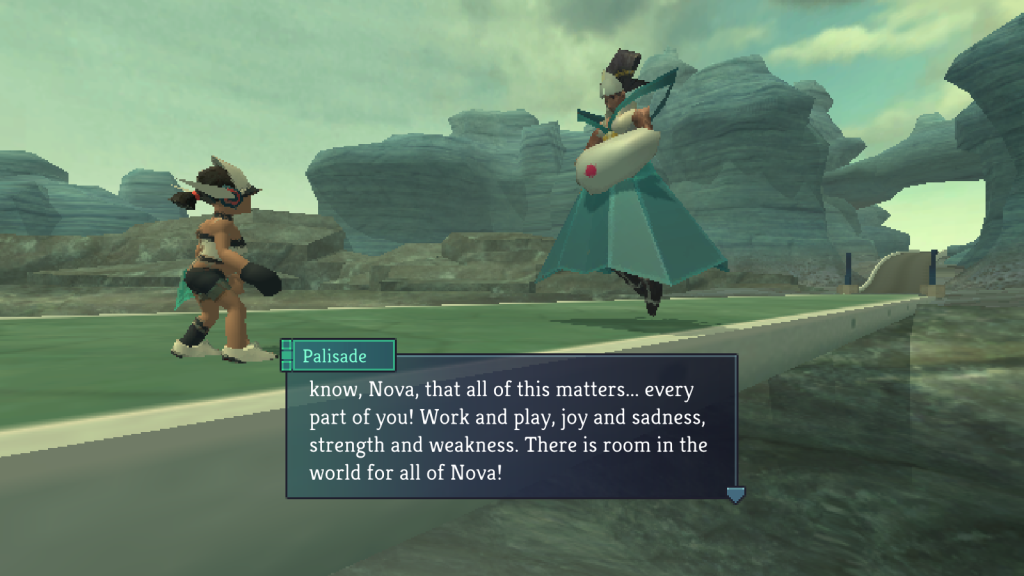
under a system maintained by violence and dehumanization, what does it really mean to "care" for others? how do we practice love in a way that directly challenges oppression, rather than enables it?
unlike psalmist, palisade recognizes something inherently precious about nova’s life, something that exceeds her function as a worker and demands to be nourished and sustained.
palisade: you are the nano cleaner, yes. but you are more than that. you are a person, with feelings and needs and desires. i want you to know, nova, that all of this matters… every part of you! work and play, joy and sadness, strength and weakness. there is room in the world for all of nova!
the love that palisade gives nova reaffirms nova’s humanity. palisade challenges the center’s exploitation of nova by declaring that she has the right to feel, to play, and to live in a way that has nothing to do with her labor. palisade’s construction of the handfruit haven represents an attempt to manifest this very space for nova outside the center's influence, where nova can cease to be a tool for power and instead be (for) herself.
to the center, who can only see nova as their property, this is an act of theft, and it will not go unpunished. palisade’s death at the end of blue vale is tragic. it is also the logical outcome of resistance to the center, its reassertion of the law, for the mere recognition of nova’s personhood is a crime to the imperialist state.
4.
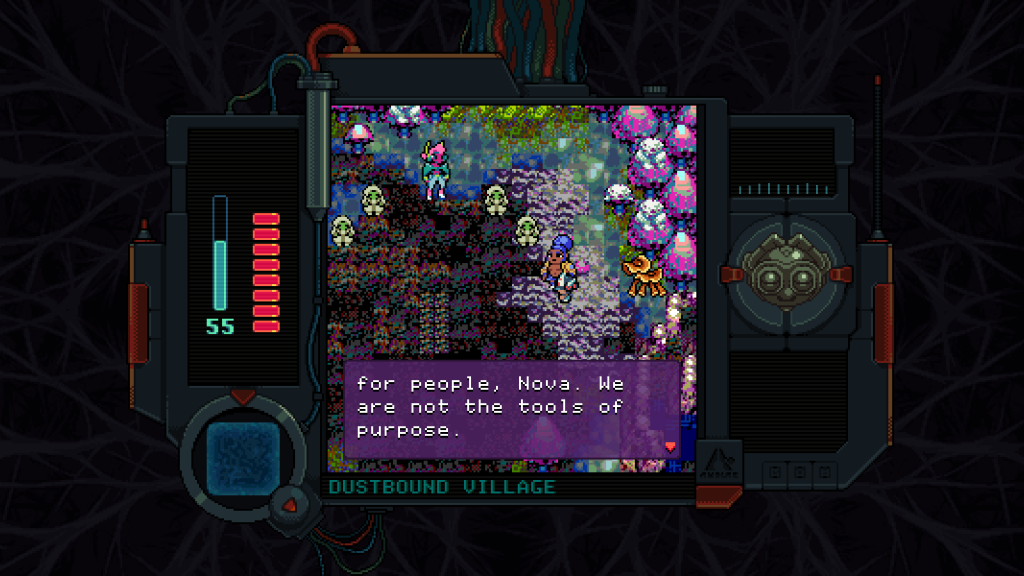
if palisade’s final act was one of radical love, then dustbound is the embodiment of this love, its manifestation as architecture, landscape, community. it’s a breathtaking space--its vibrant magenta, green and yellow flora rising from the cool, dark soil, lined with blue metal veins and cylindrical white structures, suggesting a harmony between technology and nature. the physical space of dustbound feels different from other 2d areas because the camera doesn’t suddenly shift from one screen to the next, but slowly pans with nova's movement. this makes dustbound more expansive, like nova has literally been given more space to move around and breathe in.
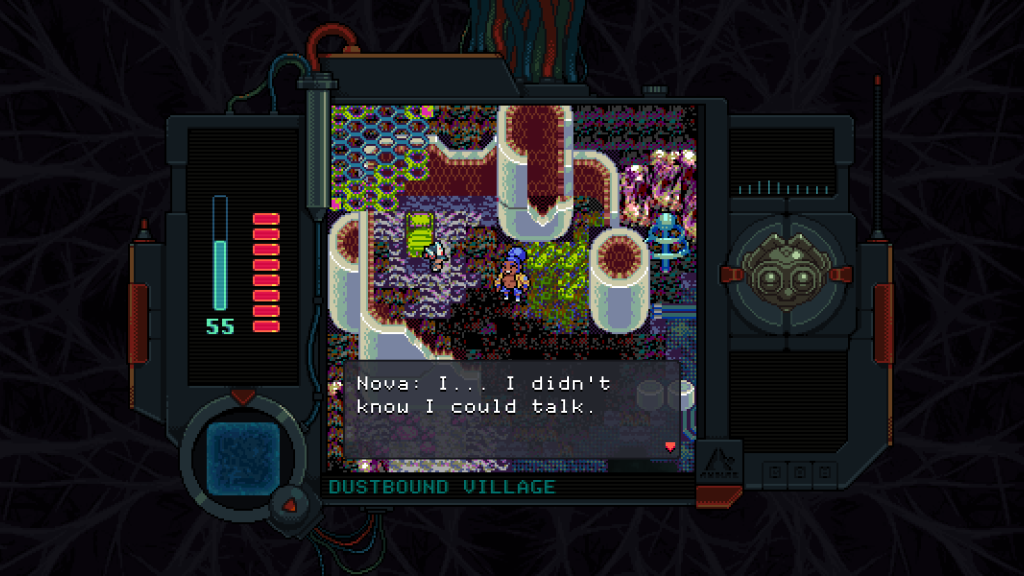
when nova first wakes up in dustbound, drem asks her to identify herself. she responds by telling him her name, and then she realizes that she has just uttered her first words. what i love about this moment is that affirms not only that our identities are always changing, but also that who we are is fundamentally tied to how we relate to and are treated by others. before, nova lived within the confines of a restrictive authority, a clearly hierarchical relation of power with her guardians. she could only ever be a silent receptacle for her guardians’ teachings and a silent witness to the suffering of others. but in dustbound, with drem, elegy, and the others, nova is treated with love, dignity, and respect. it is because drem creates the space for nova to speak that she realizes she is capable of speaking.
this transformation paves the way for other changes. just as palisade wanted, nova learns how to play. in the dustbound beatdown, nova reclaims her bodily autonomy through performance. under a new identity, the weedoron witch, nova finds pleasure moving in ways we’ve never seen before, cheered on by an adoring audience. walking and vacuuming are a familiar part of nova’s repertoire, but now she jumps to whack her opponent; then she mimes being struck herself; and finally, she twirls magnificently to deflect oncoming attacks. her laboring limbs find renewed purpose in sport and theater and dance. in the space of this seemingly tangential minigame, we see this pixelated body experiencing its first taste of freedom.
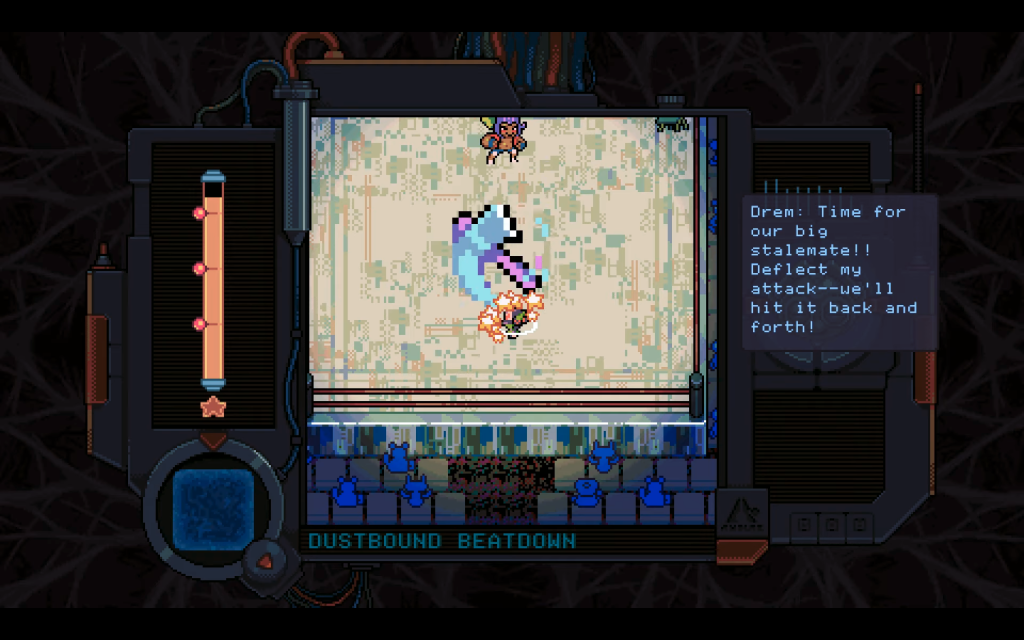
***
to jump back in time a little: upon arriving in dustbound, the first event that nova participates in is the “inearthing” of beetricks rooter. in the course of this ceremony, nova is introduced to a new understanding of death, kinship, and love.
the funerary rites for beetricks form a stark contrast to the rituals of center worship. psalmist’s verses were syntactically rigid, their subject matter lofty and absolute, praising the center and censuring those who oppose it. on the other hand, elegy’s verses contains a very different poetics:
elegy: coronate me, cardamom and pepper pods and all the wafting whimpers of your wings…
elegy: you go on ahead -
all: (you go on ahead!)
elegy: elemental traces, copy-pasted, crucializing carbon dates and grocery lists and all the times that you stayed late. i pat my hand and where you left me is a bell of soft and porous foam, a row of gills you left for me to breathe...
in this eulogy, rigidity dissolves into fluidity, and abstraction melts into the intoxicating warmth of touch, taste, smell. these lines are an exploration of spirituality within the realm of the sensual, as elegy reveals what is holy in the most mundane artifacts of intimacy. she reaffirms the sanctity of her own feelings, and unabashedly treats other people and her relationships with them as sacred. we can see this too in the way this ritual centers collective grieving and celebration: the chorus of voices repeating the refrain “you go on ahead!” make clear the value and importance that dustbounders find in togetherness. in the face of death, they center their love for one another.

the pun of elegy beatty’s name (“l-g-b-t”) is more than a random joke. it speaks to the queerness embodied by her character, and by dustbound as a whole: their refusal of the center’s binaristic worldview, its obsession with purity and virtue, its dehumanization and mechanization of people, and its violent imposition of its singular way of life.
the people of dustbound have given up on the promise of immortality by rejecting the center, and in its place they’ve built an alternative society without abusive or exploitative power structures, a state-less commune in which people paint and farm and play and just exist. they embrace the vulnerability of their bodies, because doing so gives them the freedom to live as they choose, without violence or exploitation.
so, dustbound presents nova with another way to be. here, in this quasi-anarchic communal space, she has finally escaped the obligations she had to her family and to the service of some abstract, powerful deity. in throwing off the social roles forced upon her, she has given up the comfort and security those roles gave her. she is physically and emotionally vulnerable; but this vulnerability is precisely what allows her to connect to the people around her in ways she wasn’t capable of before. now she relies on others for her own survival, and is responsible too for the sustenance of others. she begins to see that she is like a mushroom, merely one being in a web of interconnected, interdependent beings, living and caring for one another.
***
dustbound is the revolutionary heart of anodyne 2. i know the word "revolution" tends to stoke images of armed conflict, the proletariat rising up and guillotining the rich. and the game doesn't shy away from this idea of revolution, either--in the end, the center’s agents have to be defeated in order to end the center's violence. however, ano2 arguably seems less interested in showing us what we must destroy than what we must fight to create. it pushes us not only to envision capitalism’s destruction, but to envision a society that doesn’t reproduce capitalist thinking and colonial violence.
elegy and drem’s politics challenge us to see revolution emerging organically from the realm of emotions, interpersonal relationships, vulnerability and care. after all, it is the dustbounders’ recognition of the sanctity of their lives, their emotions, and their desires that makes the center’s oppression intolerable. and it is only in their shared acceptance of their vulnerability, as well as their mutual trust and support, that they find the courage to refuse the center, and the strength and love to create a new world together.
5.
narratively, nova leaves dustbound because she isn't mentally and emotionally capable of adjusting to this new worldview, this way of life, and these relationships. the glandilock seed violently rejects this change. it refuses to let nova feel happiness without also feeling immense, unshakeable guilt and self-loathing. wracked with guilt over palisade's death, she punishes herself in for becoming undisciplined, losing focus, allowing herself to feel joy. her mind is so colonized by the center that, in the handfruit haven, she creates ritual and punishment for herself, replicating the controlling structure of the center in its absence.
later, when nova confronts the center, she expresses her hatred for the glandilock seed:
i hate that it lives inside of me and wraps itself around my every experience. it hurts me when i want to explore. it numbs me when i want to feel. it makes me afraid when i want to be strong.
this is trauma in four sentences. nova is a survivor of abuse--not just physical abuse, but also psychological abuse, emotional abuse, abuse of authority masquerading as love. the control that nova’s guardians have exerted over her life has taught her to be afraid of forming relationships with new people, afraid of deviating from the values that her guardians taught her, and afraid of exploring a reality outside the one they have constructed. in the face of confusion and change, she clings to the beliefs and values and people that kept her confined but secure.
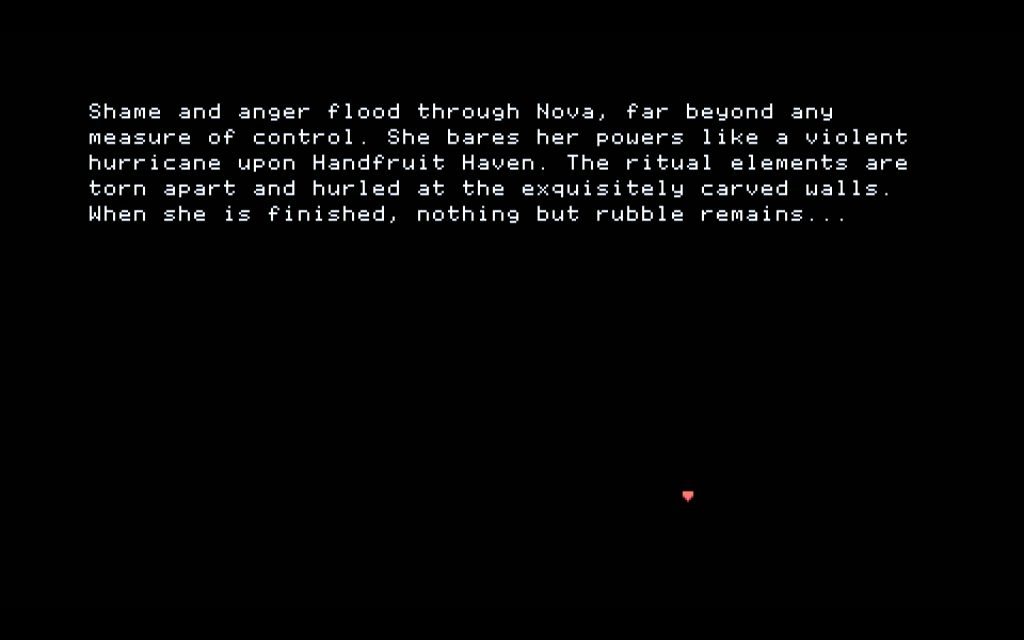
nova’s trauma freezes her in time. it hinders her growth and her ability to escape the very structures that traumatized her to begin with. it causes her to sabotage any chance she had of getting out.
***
in another sense, nova's departure was always inevitable.
if, somehow, she had decided to stay, then what would've become of the world outside? given enough time, there would be a new nano cleaner, and the center's march of progress would continue. soon enough, dustbound surely would have been overtaken. while it was necessary for nova to retreat from the outside world--to recuperate, to gain a new perspective on her life--she must inevitably return. this is dustbound’s final lesson: that nova has a responsibility to end the very violence she sought to escape from.
6.
if psalmist represents an older vision of imperialism--i.e., colonization thinly cloaked in religious missionarism--then c visionary represents a new techno-capitalist order, which regulates behavior not through rigid moralizing but through (financial) incentive.
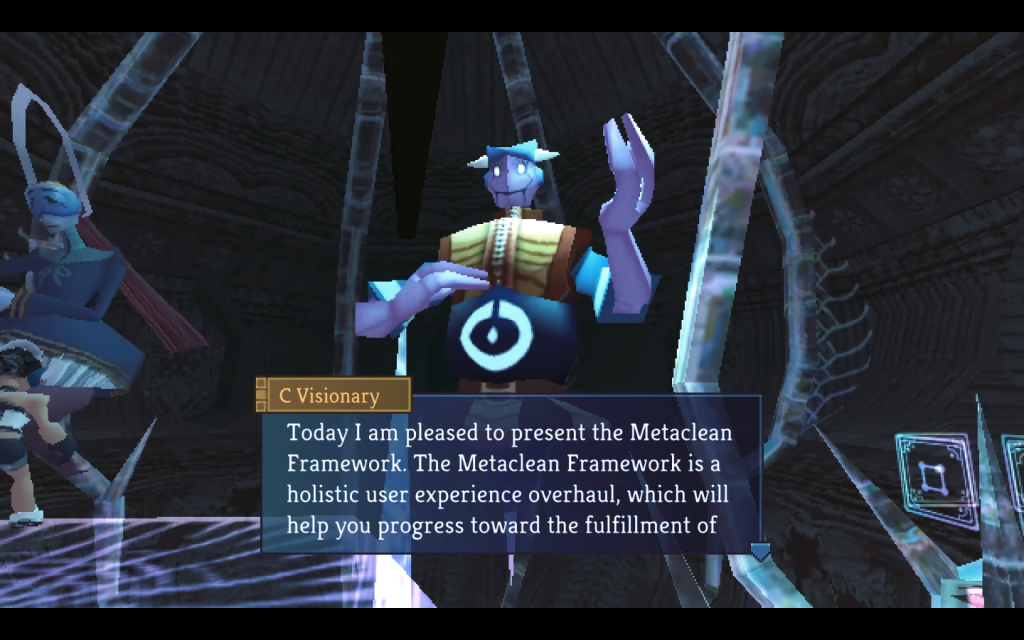
where psalmist tried to control nova by confining her to a strict moral system, in which she had to work to suppress her "evil" impulses out of guilt and shame, visionary's approach is to evade this moral tension entirely. visionary’s method embraces nova's (or more accurately, the player's) "base" desires: he incentivizes nova to continue cleaning by scattering metacoins throughout the realm, which can be used to purchase info logs and other world lore from the metaclean manual. this technology-driven approach preys on your desire for accumulation and game completionism.
upon returning from dustbound, nova discovers that the final goal of the center is to achieve the anodyne, which will bring about the reunification of the world’s people and their creator (cf. evangelion’s “human instrumentality project”). psalmist describes the anodyne in spiritual terms as salvation, the end of our souls’ hunger and suffering. visionary describes it in terms of technology and productivity, as a state of “perfect efficiency” and “infinite energy,” a promise of wastelessness and losslessness. ultimately, the anodyne is the culmination of both psalmist’s and visionary’s desires: one supreme order, one that seeks to rid the world of "imperfections" through the forceful imposition of one immortal, unified, and unchanging state. this is the destructive impulse of fascism, the methodical elimination of every Other.
i am reminded of this passage from jenny odell's how to do nothing, on the relationship between technology and the body:
most of this era’s transcendent technological visions remain motivated by a fright of the body and its myriad susceptibilities, by a fear of our carnal embedment in a world ultimately beyond our control--by our terror of the very wildness that nourishes and sustains us.
both psalmist’s and visionary’s philosophies reveal exactly this "fright of the body" and fear of “wildness." psalmist would call this wildness a corruption of our perfect nature; she believes that the world should be rid of nano dust in order for the “susceptibilities” of the body to be suppressed and overcome. in doing so, psalmist believes we can ward off mortality and bring people closer to the immortal center. this aligns perfectly with visionary’s capitalist impulse, accumulating power, advancing technology in order to extend one’s life forever into the future. it is the imposition of the will over all else--nature, other people, even the body, this sort of ayn-randian unfettered expression of the ego. both worldviews rely on the subjugation of the flesh toward some higher abstract purpose, be it god or profit. both share a certain rationalism that reduces life to a series of numbers to be increased to infinity, that sees populations as messes to be tidied up and homogenized.

what each fails to understand is that life itself is in wildness, in the flesh and its vulnerability and its manifold desires. psalmist proposes that all beings in the world be united as one, but in this case, what is unification, if not the violent elimination of all difference? difference is what enables the joyful friction of beings brushing against one another, figuratively and literally. difference is the foundation on which eros rests (borrowing less from freud than from audre lorde), for the erotic is the desiring of another, the sharing of joy with another, connection not in spite of but across difference. "wildness" is that which "nourishes and sustains us,” just as eros was born from chaos. the elimination of that wildness is a death sentence.
7.
the penultimate section of the game is overhung by nova's final dilemma: will nova confront the center, or will she continue to do its bidding? the levels in outer sands serve as explorations of different aspects of this decision. each world is a variation on themes that the game has presented thus far, meditations on love (loquat skelligum), death (pastel horizon), etc. that deepen the philosophical and emotional implications of nova's crisis. there are just two i want to talk about here.

"no such scene" is an extra-dimensional interlude that recasts some of anodyne 2's themes and narrative elements in a slice-of-life-turned-supernatural-horror game.
nora eggers's predicament is similar to nova's: she is stuck in a tiring, repetitive job, and lives in the psychic aftermath of familial trauma. in one of nora’s memory-dreams, she comes out to her mother, who treats it as a karmic punishment, some evil or defect that resulted from bad parenting. nora’s mother emotionally abuses her through manipulation and guilt, twisting nora's mistakes as deliberate attempts to injure.
in response to her mother’s emotional abuses, nora has built up a detachment; this feeling of detachment pervades her life and is compounded by her experiences as an exploited fast food worker. throughout no such scene, we get the sense that nora feels thoroughly disconnected from her work, her emotions, and her social life. “i’ve never felt truly bad,” she assures herself, giving voice to her numbness.
the motif of slow accumulation/destruction is salient here, in seemingly offhand pieces of exposition--
rivulets of rainwater feel like nothing, but over time they can crumble mortar and carve canyons into masonry.
each [cookie] has just a tiny fraction of flavor, it’s like i have to add them all up to have enough.
this motif, paired with the drudgery of nora’s days, her continual return to her soul-sucking job, and her emotional detachment, call to mind the erosion and endless withering i feel in my soul and body under capitalism. this, i think, is the point. nora is stuck in a job and life that are killing her, but she remains in them because they comprise the only life she knows, or even feels she deserves. these forces of slow but steady death are (literally) concretized by the figure of the gargoyle, who threatens to completely devour nora. the only way for nora to avoid being consumed by the gargoyle is to click on a mysterious link on her computer, which offers some promise of escape. while the ad attached to the link seems dubious at first, the ending of no such scene--with the gargoyle on one end of a narrow hallway, the computer on the other--that there is simply no other alternative. trust in the link, or die.
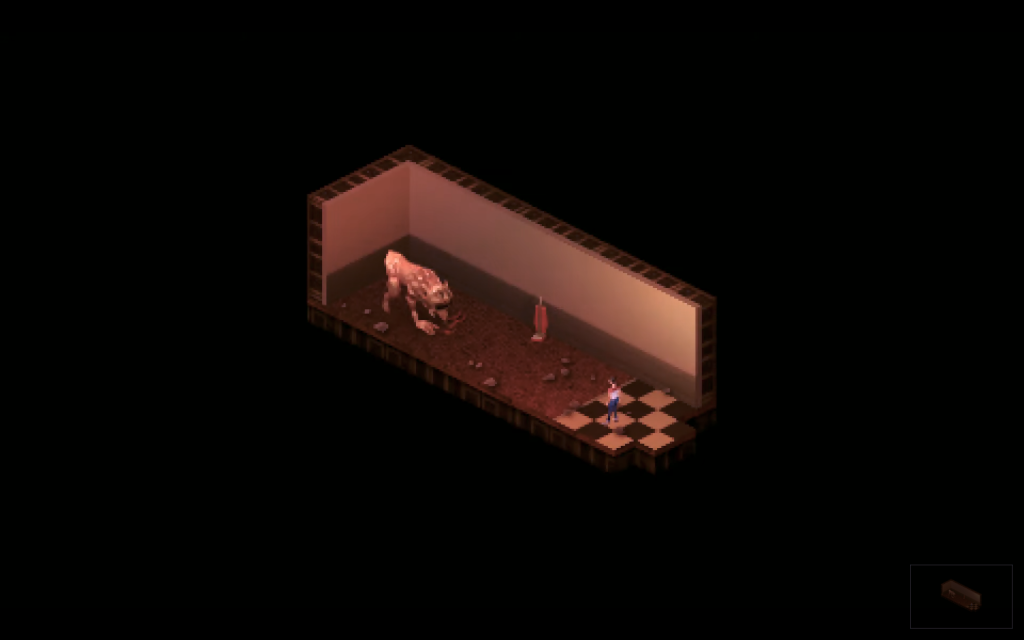
the shift in genre in no such scene lays the stakes of nova’s choice in starker and more visceral terms. particularly, it shows us how nova's dilemma, to obey or confront the center, is really the same as nora's: to escape into an unknown, scary but liberating future, or to accept the sure death of capitalist alienation.
***

the other “interlude” i’ll touch on briefly is orb sector 4-16-5. the story functions as a tidy fable about the tension between what we might call contentment versus a desire for "expansion.” like dustbound, orb sector shows us how radical politics emerge quietly from everyday life.
minorma: how can you be so ignorant and so happy?? don't you feel imprisoned, with no mysteries to explore?
minorma embodies the driving force of colonialism. like the center's agents, her only desire is to expand and accumulate, in a material sense, conquering foreign lands, accruing wealth and ignoring the bodies trampled underfoot. meanwhile, fabrahem and the other orb sector citizens represent a countervailing politics of degrowth. they would argue that no technological innovation or advance in "civilization" is worth the exploitation or domination of another being.
this is something that isn’t touched on explicitly in dustbound, but is nevertheless related to the project of imagining an anti-colonial world. it is a question about human nature, which matters because narratives about human nature structure our political imaginings. minorma challenges us with this question: can people truly be content with their lives, having to perform the same tasks over and over in the same bounded space, without power to accumulate or territory to conquer?
and to this fabrahem would answer, simply, assuredly, that they can. the people of orb sector find great pleasure in their work, whether work means creating new dance moves, baking focaccia bread, or archiving “the history of the orb.” this story argues that when work is not forced labor, nor is it a means to an end (e.g. profit), then it can be done for the sheer pleasure of itself, self-contained and self-complete. people find fulfillment in learning and improving just because, like lashawn mixte and her temporary dust paintings, or nova and drem in the dustbound beatdown. they engage in art for its own sake and play for its own sake. this is Enough. it has to be.
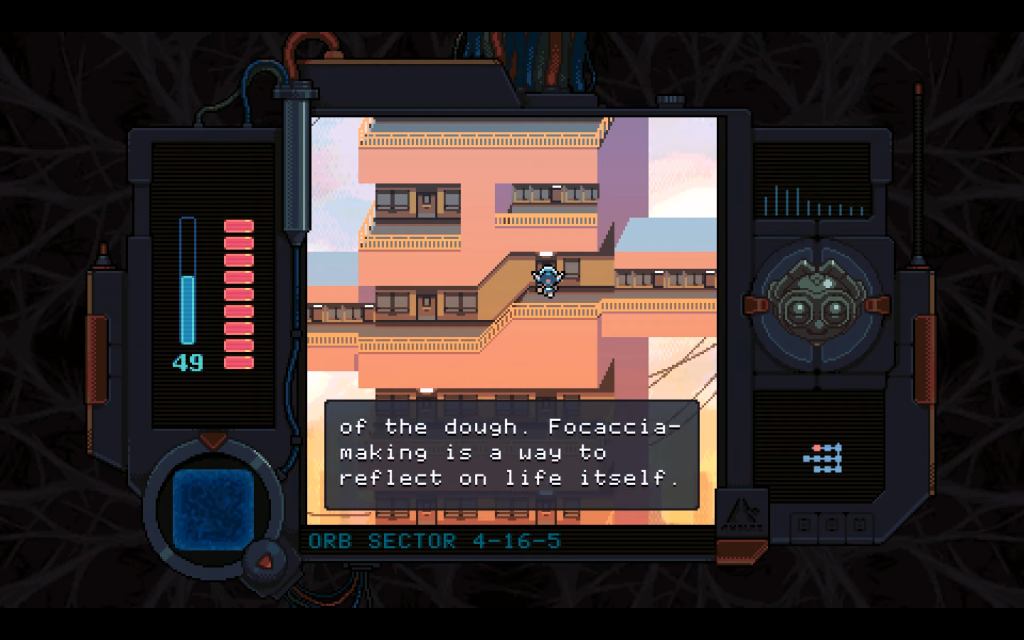
this is a refusal of the center's linear march toward "progress," as well as its imposition of that "progress" through force and exploitation. orb sector doesn’t refute the desire for change or to explore uncharted territory. rather, it reminds us that mystery is not something that can be found in colonizing foreign lands, nor is happiness achieved in blood-soaked immortality. there is mystery enough, pleasure enough in the quiet turning of hands around dough and the arc of dancing limbs.
8.
when nova returns to dustbound village, she finds that it has been completely supplanted by "robustbound" village, its former inhabitants now obedient disciples of the center. but she manages to find elegy and her child ash unscathed. the two start talking, and at one point nova tells elegy that she is afraid she can't confront the center, because the glandilock seed will always be inside of her. she fears that this trauma will always have power over her and that she will never be able to heal from it. and elegy replies:
as long as you are alive, nova, that is your gift. you can always become something new.
elegy affirms the inconsequentiality of how nova was born, what social role she has been confined to, and what her parents raised her to be: nova can be whoever she wants to be. it's a simple statement, but it encapsulates so many of the game's themes. it is an affirmation of nova's capacity to heal, to separate from her family of origin, to embrace (gender-)queerness, and to finally quit her fucking job.

what is there to say that hasn’t already been said? the ending is just a formality, the necessary outcome of everything we've already talked about. in the end, nova chooses to confront the center because she has embraced a vision of a better life and a better world. she shrinks inside nano cleaner zera and removes zera's glandilock seed because she wants to end the cycles of exploitation and trauma that she herself survived. psalmist sacrifices herself to kill visionary. with the center's agents dead, nova escapes with zera, signaling the formation of a new, chosen family. the two join up with elegy and ash, and the four board a boat to sail far, far away from here. fade to black.
***
i said before that anodyne 2 is a game about nova moving from religious authoritarianism to queer anarchy. it would be equally accurate to say that anodyne 2 is a game about becoming, in the game's own terms, "mommy." nova, drem, elegy, and palisade capture the revolutionary potential in mothering--the vital work of nurturing, sustaining, attending, and loving in a hostile world, in ways that challenge the ruling order. it is in the act of revolutionary mothering (to borrow from the title of alexis pauline gumbs’s book) that nova fully, viscerally embraces vulnerability and the interdependence of life.
it’s only fitting that the song that plays as nova and elegy depart with their children into unknown waters is a remix of palisade’s theme, in memoriam of the mother who first taught nova that another world was possible.
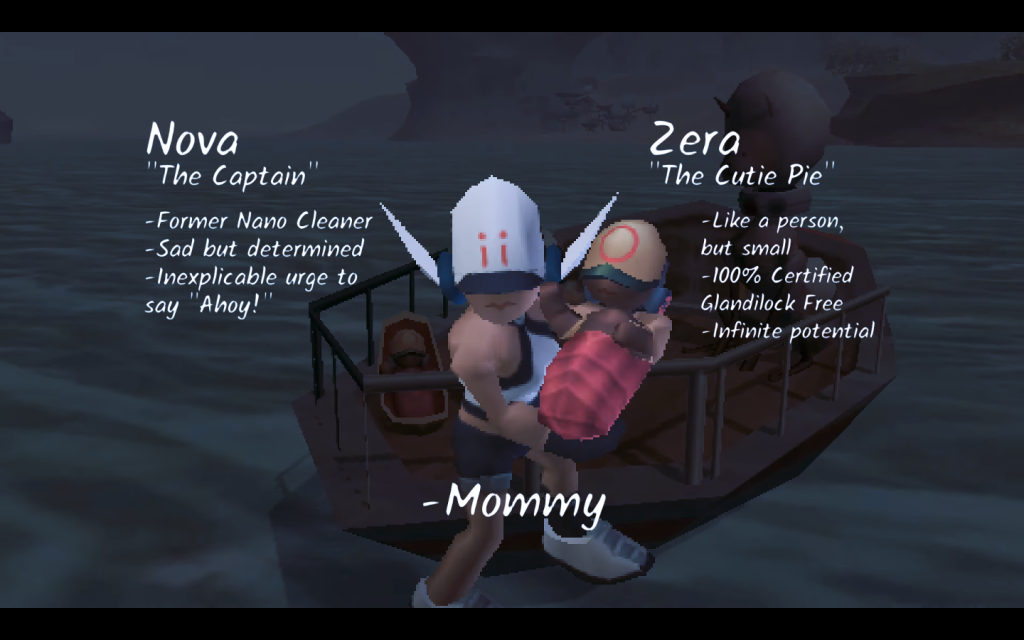
***
postscript
thank you for reading my essay on anodyne 2. there are so many things i wasn’t able to include here, dozens of paragraphs lost in analyzing every detail, appreciating its memorable characters, its infectious humor, its vibrant, dreamlike landscapes. i didn’t get to talk about pastel horizon, or loquat skelligum...but if you’ve played the game, then i guess you already know. (and if you haven’t, thank you for reading this essay anyway!)
ultimately, i love anodyne 2 because it tells a vitally important story. that’s what i wanted to convey. it is a game about struggling to survive under systems of control and violence. it is also about learning how to radically love one another and ourselves, and the necessity of vulnerability, intimacy, and care in dismantling structures of oppression.
in other words, it is that thing we desperately need, now and always: the story of our own liberation.